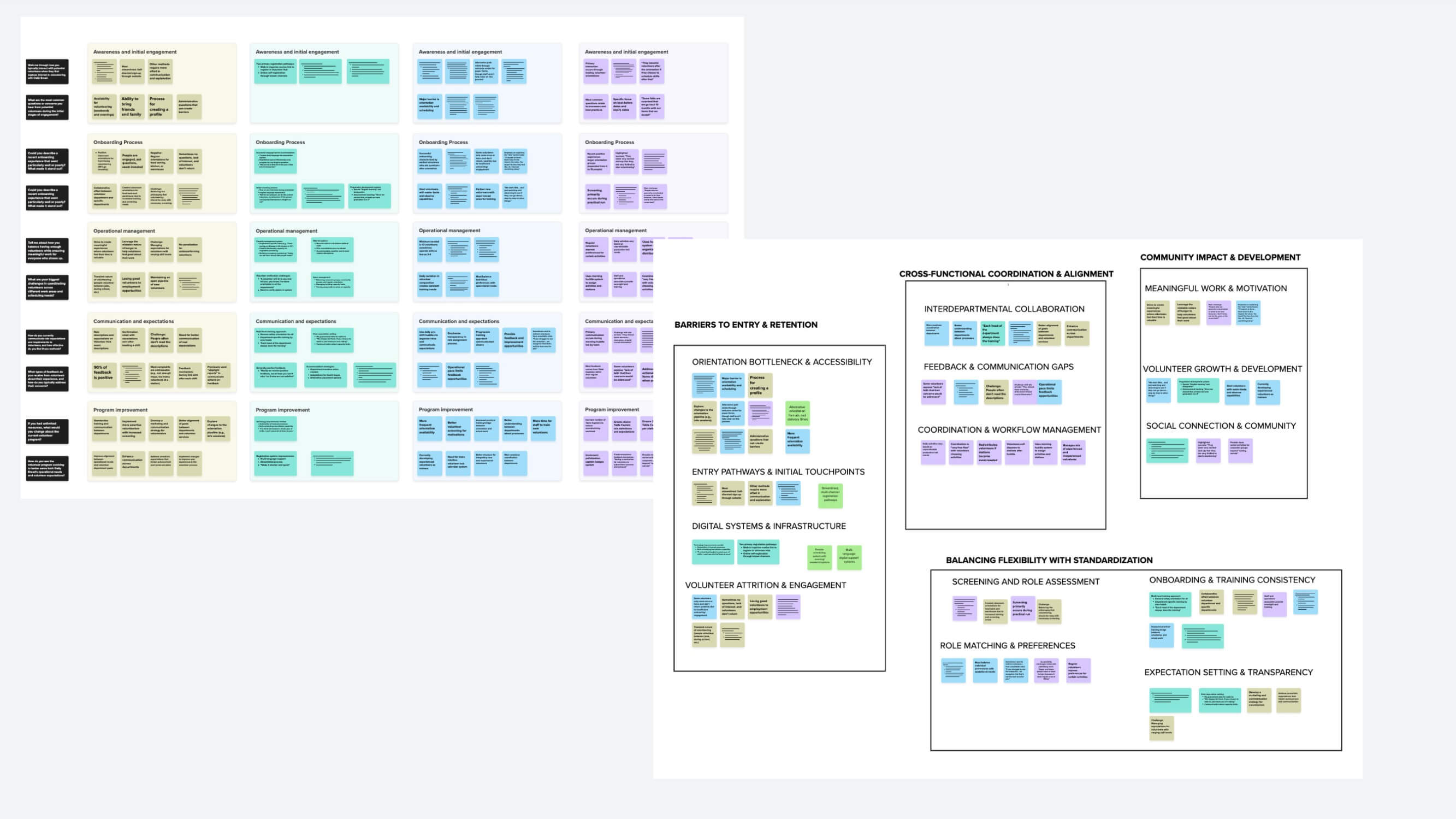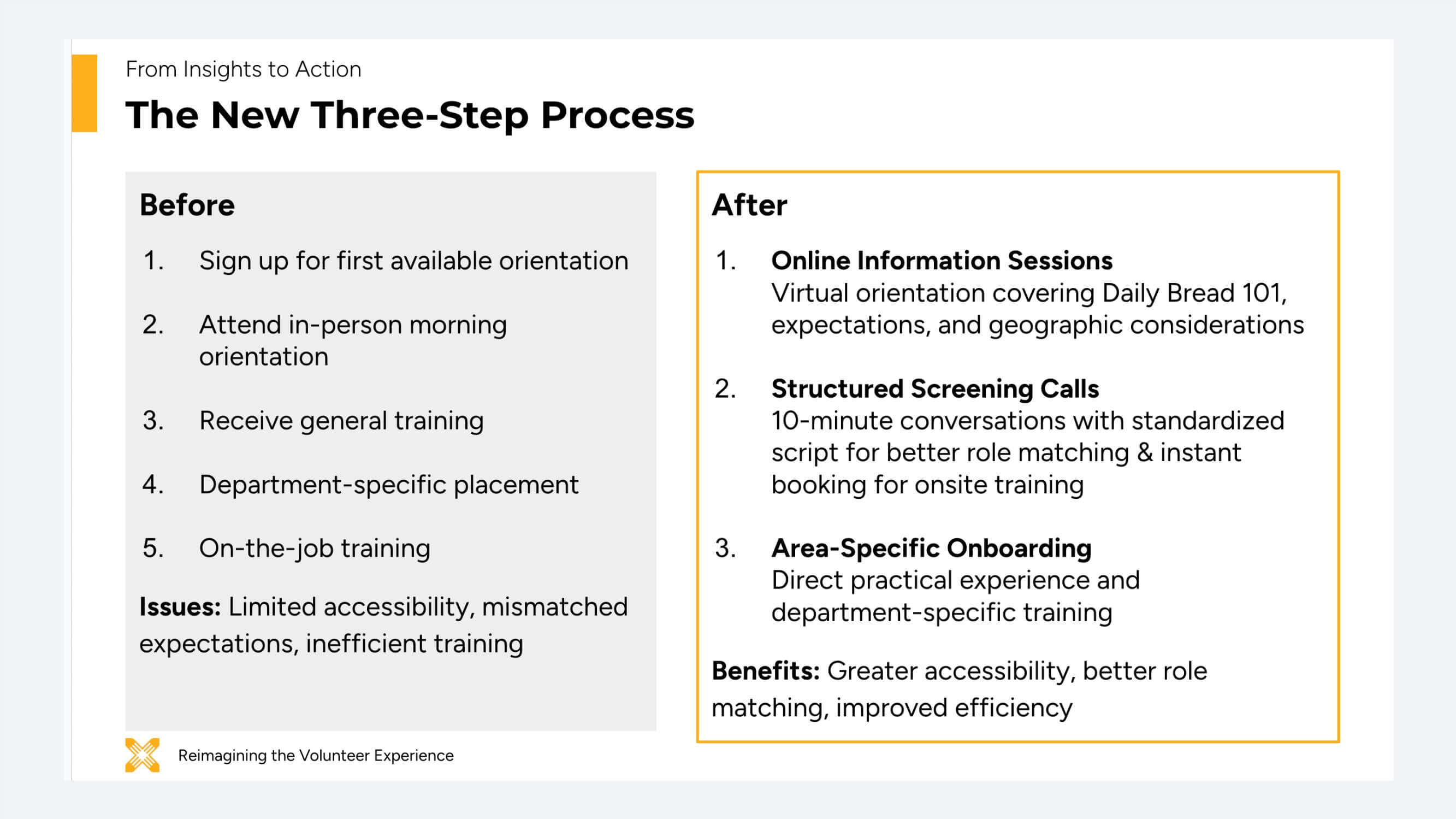Reimagining the Volunteer Experience at Daily Bread Food Bank
Optimized volunteer program operations for Toronto's largest food bank, leading to immediate implementation of new three-step engagement process serving 8,000 annual volunteers.
Problem
Daily Bread Food Bank, Toronto’s largest food bank serving 1 in 10 people accessing food assistance in the city, faced critical challenges managing its massive volunteer program. With 8,000 volunteers contributing 123,000 hours annually across 132 member agencies and 207 food programs, the organization struggled with operational inefficiencies that impacted both volunteer satisfaction and service delivery.
The volunteer program faced three key challenges: excess volunteers with insufficient meaningful roles, misaligned expectations between volunteers and organizational needs, and significant bottlenecks in the onboarding process. Morning-only orientation sessions created barriers for working volunteers, while limited screening led to poor role matching and high turnover.
Staff were spending significant time on basic registration support (5+ people per week), and departmental silos created communication gaps that reduced program effectiveness. The organization needed to balance conflicting business needs: creating a seamless volunteer experience with minimal friction while ensuring volunteers met operational standards and added genuine value.

Approach
Civiq Design conducted a comprehensive service design discovery to understand the current volunteer experience and identify opportunities for systemic improvement.
Research Methodology:
- System mapping documenting the complete volunteer journey from awareness through active participation
- Stakeholder interviews with volunteer coordinators, department supervisors, front-line staff, and welcome center personnel
- Needs and pain points analysis mapping challenges across the volunteer lifecycle validated through research evidence
- Synthesis workshops translating findings into actionable recommendations
Discovery Process: The research revealed a complex volunteer journey with multiple touchpoints across different departments and systems. Four critical themes emerged: expectation and role alignment issues, access and inclusion barriers, operational efficiency gaps, and communication breakdowns between departments.

Strategic Framework: The analysis identified that successful volunteer engagement required balancing accessibility with operational effectiveness, leading to recommendations for a restructured three-step process that would address both volunteer needs and organizational requirements.

Outcomes
The most significant outcome of this discovery is that Daily Bread immediately implemented major systemic changes based on the research insights, launching a new volunteer engagement process in January 2025.
Immediate Impact: The new approach addresses core pain points identified in the research: improved accessibility through virtual orientations, better volunteer-role matching through structured screening, and reduced administrative burden through streamlined processes. Early indicators suggest the system will significantly improve volunteer retention while maintaining operational standards.
Operational Transformation: By making initial orientation virtual and available to all, while using targeted screening and role-specific training for proper placement, the solution successfully balances the need for seamless volunteer experience with the imperative to maintain operational excellence. Staff time previously spent on basic registration support has been redirected to more strategic volunteer engagement activities.
Measurement and Sustainability: Daily Bread is monitoring conversion rates from information sessions to screening calls, tracking volunteer retention after first shifts, and comparing metrics to historical data. A volunteer satisfaction survey planned for May 2025 will provide additional insights into program impact, ensuring continuous improvement of the new system.
The changes create a more accessible volunteer experience while enhancing operational effectiveness, demonstrating how human-centered research can drive immediate organizational transformation in the non-profit sector.